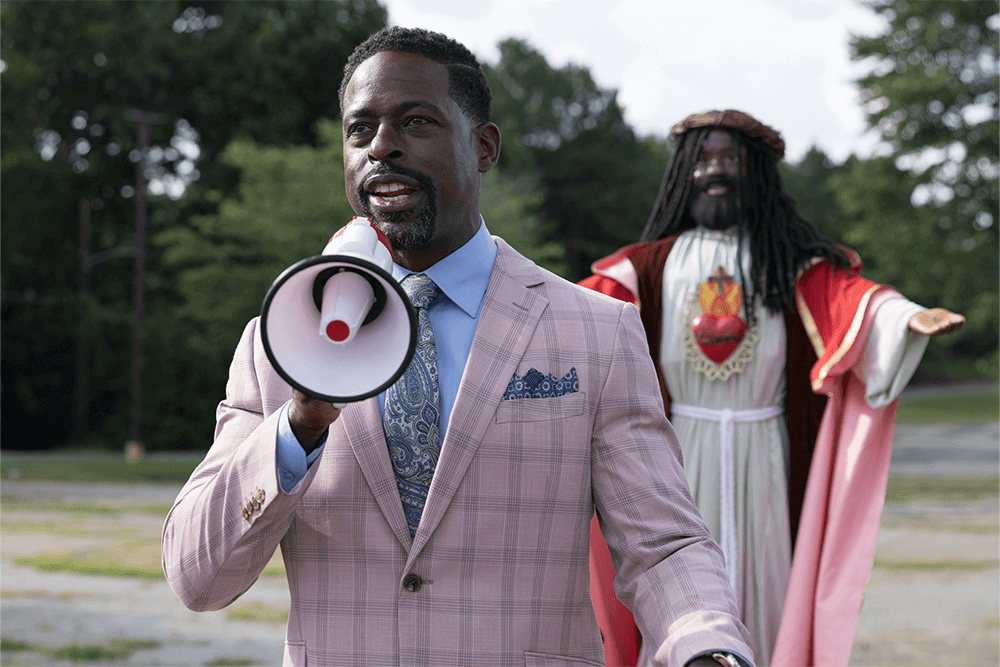
“Look, you don’t get to pick how the devil torments you,” says Pastor Lee-Curtis Childs (Sterling K. Brown) to an unseen documentarian toward the middle of the comedy Honk for Jesus. Save Your Soul. We believe him. Never mind the fact that most of the film has shown Lee-Curtis to be misguided at best and craven at worst: a prosperity gospel megachurch pastor who flaunts his clothes and lifestyle as a form of worship. But these words sound more sincere than the self-aggrandizing nonsense he usually pedals. His statement seems rooted in genuine reflection, contrition for the (at that point unrevealed) scandal that caused his downfall.
Honk for Jesus follows Lee-Curtis and his wife first lady Trinitie Childs (Regina Hall) as they prepare a grand reopening for their Atlanta-area megachurch. Writer-director Adamma Ebo takes a mixed-media approach, using not only standard cinematic techniques but also news show clips and documentary footage. In the movie, now streaming on Peacock, the Childs hire a film crew to document their return to glory, a conceit that allows Ebo to tell jokes in the faux-documentary style of The Office. These moments revel in the Childs’ lack of self-awareness, showing Lee-Curtis explode into a profanity-laced tirade after getting gum on his Italian designer shoes or Trinitie buying a $1,000 hat.
Some might consider prosperity gospel pastors easy targets, but Ebo shows real skill in the construction of her plot and characters. One of the best sequences finds Lee-Curtis so moved by his own prayer that he strips off his clothes, strutting his chiseled physique in front of the congregation while Trinitie guides him toward the baptismal font. In another, Trinitie and a former congregant have a passive-aggressive stand-off, spitting “bless your heart” at each other as the tension escalates.
But when Lee-Curtis sits in his office, talking about the devil’s torments, his posturing seems to drop. “You know, I volunteered for this,” he reminds the interviewer. “I chose for y’all to come down here to truly see and to show the world what I’m truly about.” With seriousness, Lee-Curtis insists, “I promise to God, this is who I am.”
Spoilers follow
While the disparity between the Childs’ on-screen and off-screen identities makes for some good gags, comedy gives way to tragedy as the movie continues. Midway through the film, we learn that the scandal involved Lee-Curtis’ exploitative sexual relationships with young men in the church. He offered these men spiritual direction, as well as extravagant gifts such as cars. Ultimately Lee-Curtis abused his power over them, casting them aside when he was done. When juxtaposed against Lee-Curtis’ homophobia, Lee-Curtis’ statement about the devil and temptation becomes clear: The devil, Lee-Curtis believes, is tormenting him with sexual desire for men. The Childs have hired the documentary crew to present them as a perfect heterosexual couple, temporarily brought low by an attack from the devil.
When it comes to the devil, the best person to turn to is Trappist monk and theologian Thomas Merton. Merton’s New Seeds of Contemplation describes how the devil convinces people that good things, created by God, are sins. In this way, the devil makes “many disciples by preaching against sin.” In the film we see Lee-Curtis, a man who refuses to see the queerness God gave him as anything but a sin. Not only does he cause untold harm to others by preaching against LGBTQ people and exploiting young men who trust him, but he harms himself by denying the gift of sexuality God created for him. Like so many people in the real world, Lee-Curtis suffers when he rages against God and God’s good creation. In Merton’s language, they live in a type of hell, because “in hell there is everything but mercy.”
For as much as the Childs insist their lives are blessed by God’s favor, pointing to their giant house and luxury clothes, Honk for Jesus constantly shows their suffering. One of the most poignant moments finds Lee-Curtis letting his guard drop after the documentary crew has stopped filming to flirt with the sound guy. Ebo and cinematographer Alan Gwizdowski begin with a wide shot of Lee-Curtis and the sound man as they begin to talk and then slowly zoom in with a graceful unbroken take. When Lee-Curtis attempts intimacy, lightly placing his hand on the young man’s cheek, Ebo and Gwizdowski switch to a handheld camera, the shaking frame underscoring his vulnerability.
The scene ends abruptly, as the young man’s rejection offends Lee-Curtis and Trinitie arrives to rebuke him for threatening their comeback. In the anger and embarrassment between the couple, we see the merciless hell that Merton described. In their interactions, there’s no sign of the God the Childs claim to profess, the Christ who promises, “My yoke is easy, and my burden is light,” “The truth will make you free.”
Throughout Honk for Jesus, Lee-Curtis is proven correct: You cannot choose how the devil torments you. But their torment is not Lee-Curtis’ sexuality, a good thing created by God, but their inability to be their truthful selves, even when the cameras are off.

